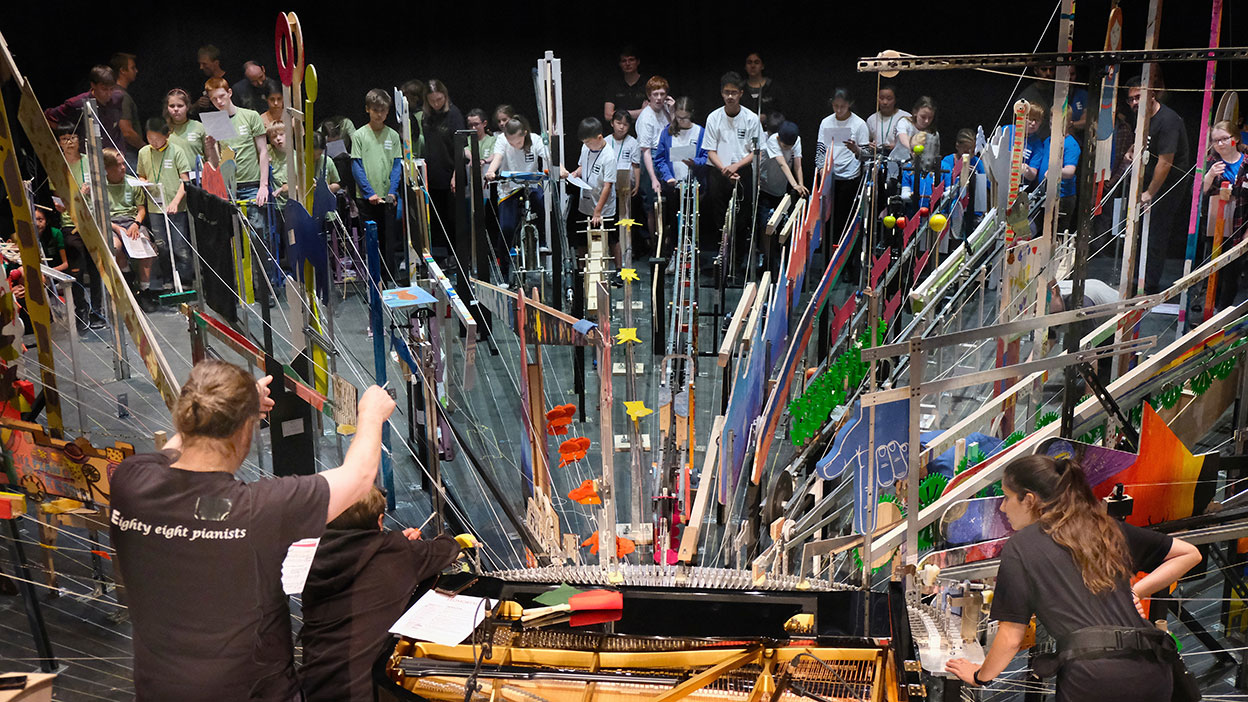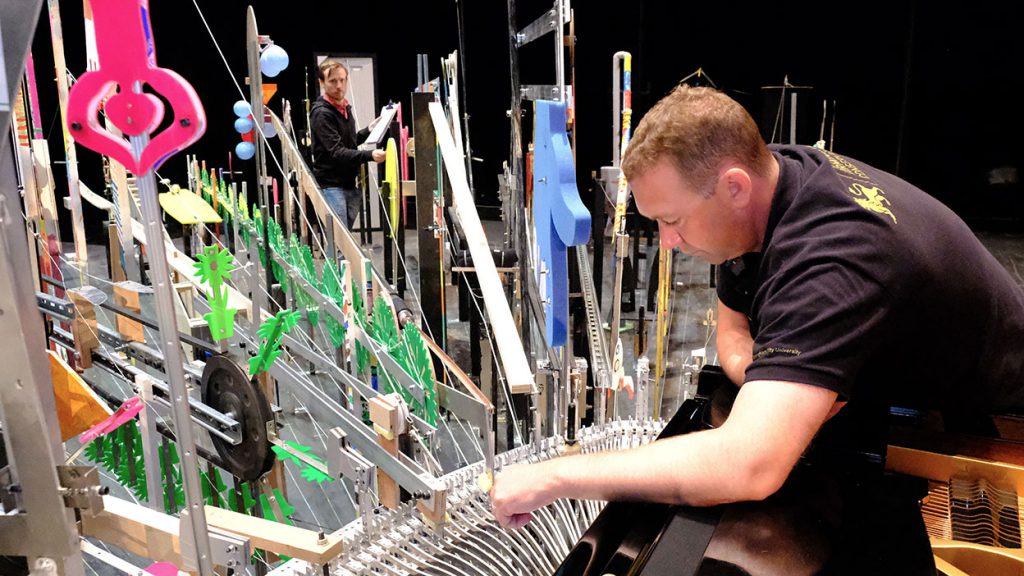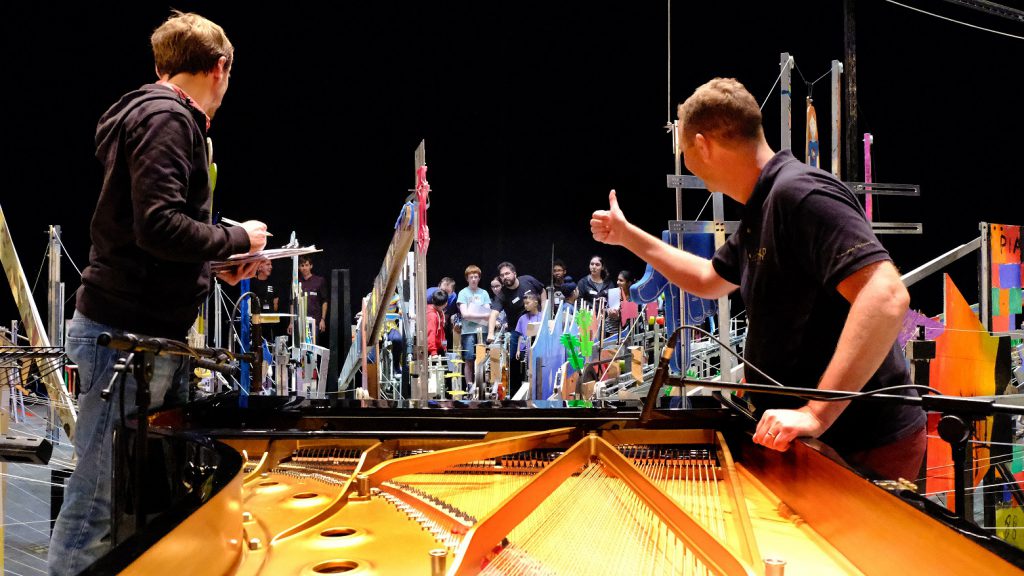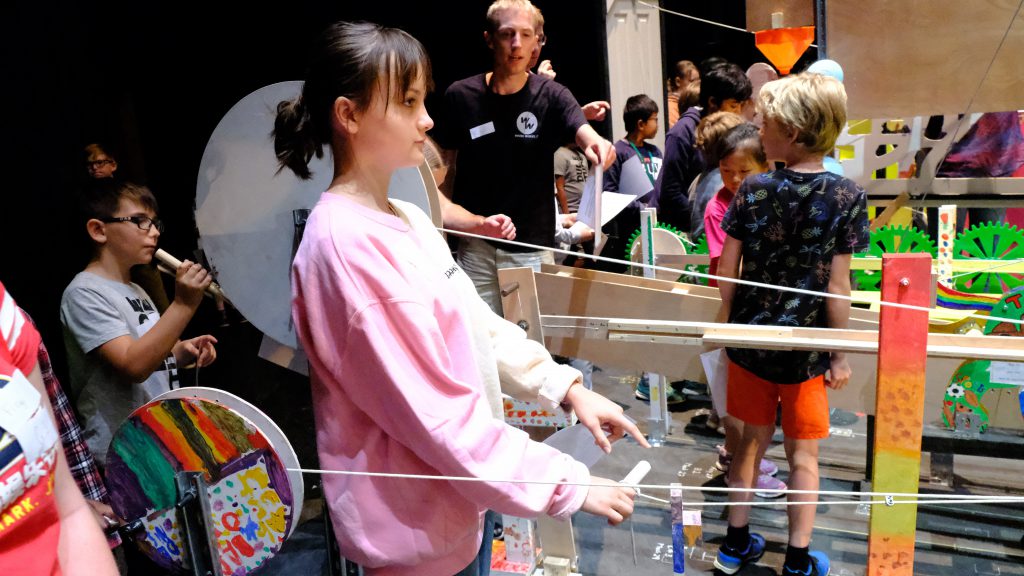
August 27, 2019, by Lindsay Brooke
Nottingham researchers help 88 pianists reach new world record
Their website – 88 Pianists – and their twitter feed – @88pianists – say it all.
WE DID IT! 88 Pianists have set an unbreakable world record! We were featured on The One Show on Tuesday 20th August 2019.
Researchers from the Faculty of Engineering played an integral role in setting the world record for the most number of people to play a single piano at the same time.
The project was part of a national outreach programme led by the University of Cambridge which saw the Nottingham engineers work with more than 100 students from three local schools: Robert Mellors Primary School (Nottingham), Edna G Olds Academy (Nottingham) and Lawn Primary School (Derby). Six imaginative and unique inventions were chosen from the 3 schools to be developed and manufactured for the record setting performance.
The University of Nottingham also machined components for the keyboard interface assembly at the Advanced Manufacturing Building. This included over 200 brackets and 88 mechanical extendable fingers to the piano.
The project began in 2018 when Professor Julian Allwood from the University of Cambridge decided to break this world record to commemorate the 500th anniversary of Leonardo da Vinci. As there are 88 keys on a piano, they chose to use 88 individual players – one for each key on a piano – to ensure that the record they set, would never be broken. In order for that many people to reach the piano, they needed inventions which would allow each player to reach their piano key from 7 metres away.
Along with the University of Cambridge, the Royal Birmingham Conservatoire, and eight other UK universities, they attended and worked with primary schools from across the UK to design these mechanisms. 88 inventions were selected from the 2,500 submissions, built by the engineers and the school children and used to play the specially-composed piece at the Birmingham ICC.
From flying rabbits, ballerinas and giraffes to trains and popping balloons, the engineers returned to the schools and set about making these dreams a reality. The Nottingham designs included:
- Flying Football (Mechanism #3: Robert Mellors Primary Academy) – a pivoted leg and football to play a piano key.
- Air Pump (Mechanism #18: Robert Mellors Primary Academy) – a hand pump mechanism with handle that pivots to play a piano key.
- Mechanism #22 Hand metal (Robert Mellors Primary Academy) – a large pivoting hand with string attached to activate the lever and play the piano key.
- Mechanism #61 Ding (Lawn Primary School) – a unicorn body with a nodding head attached to a string to activate the lever and play the piano key.
- Mechanism #63 Washing line (Lawn Primary School) – a sliding pole and leg supports for a washing line with an 88 pianist t-shirt hanging from it to play the piano key.
- Mechanism #86 Giant Kit (Edna G Olds Academy) – design based on a robot which has levers for arms to play the piano key.
The world record was successfully achieved on Monday 19th August 2019, in front of more than 500 leading engineers from around the world, who had gathered together in Birmingham’s ICC for the 69th CIRP General Assembly. A special piece of music composed by Martin Riley, which used the DNA of Da Vinci himself and combined with the amazing support of the Royal Birmingham Conservatoire, part of Birmingham City University was performed. The official world record attempt was judged by Julian Lloyd Webber who delivered the amazing news that the record had been set with all 88 keys officially being played.
The world record breaking performance was filmed by The One Show.
Preetum Mistry from the Composites Research Group, who was the project lead from the University in this collaboration, said:
“The 88 Pianist project has been the ultimate combination of science, technology, engineering and mathematics (STEM) intertwined with art and music. It has been a fantastic experience and incredible journey. It was great to be able to work with so many school children on this project. Our role was to introduce the engineering challenge and then facilitate the creative process. The outcome was a huge success and we were blow away by their enthusiasm, creativity and energy. We aimed to inspire the next generation of engineers, but it turned out… they inspired us!”
The team involved:
Adam Clare – academic lead
Preetum Mistry – project lead
Lindsay Smith/Sarah Shackleton – schools lead
Peter Smith – engineer
Monica Castro – engineer
Javier Picavea –engineer
Irati Sanchez – engineer
Emmanuel Ofomana – school visit support
Alexander Jackson-Crisp – technician
Paul Johns – technician
James Bonnyman – school visit support
Toluwalase Fayese – school visit support
Nicholas Winter – school visit support
No comments yet, fill out a comment to be the first




Leave a Reply